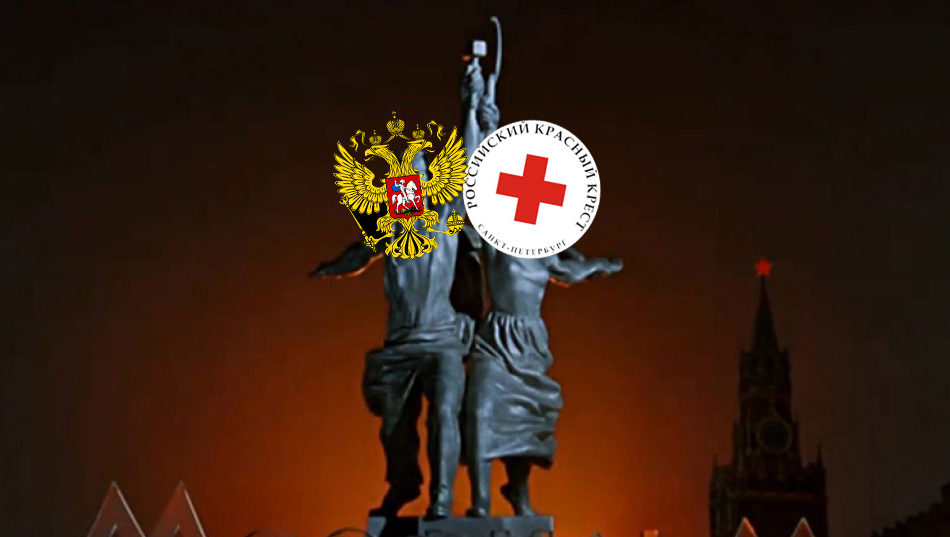For over 150 years, the International Movement of the Red Cross and Red Crescent has religiously guarded its neutrality in conflicts, in order to provide humanitarian aid to those in need on both sides of the front. This rule has been shaken by the Russian Red Cross Society's alignment with the Russian government, leading it to collect items for the Russian Army, including military staples for underequipped troops and drones which are used to correct artillery fire against Ukrainian soldiers.
Red Cross joins Russian home front movement
The first warning signals of the Russian Red Cross' trajectory appeared in October when this national office of the humanitarian organization started a fundraiser to support families of Russian servicemen and mobilized soldiers with humanitarian and psychological help. This act in itself borders on non-neutrality and, by increasing the comfort of those on the home front, is likely antagonistic to any burgeoning anti-war movement of soldiers' mothers.
Making the Russian Red Cross' actions even less neutral is the fact that they are held as part of Russia's MyVmeste campaign, translated as "We are together."
This home front movement, initiated by Vladimir Putin, inter alia, supports Russian soldiers by delivering them food, military gear, and children's letters, creating hand-made "trench candles" and portable heaters so the invaders can better withstand the winter cold in Ukraine, instructing schoolkids to assemble UAVs that can correct Russian artillery fire at the front, and printing chocolate wrappers for soldiers with illustrations by Russian kids wishing them victory:
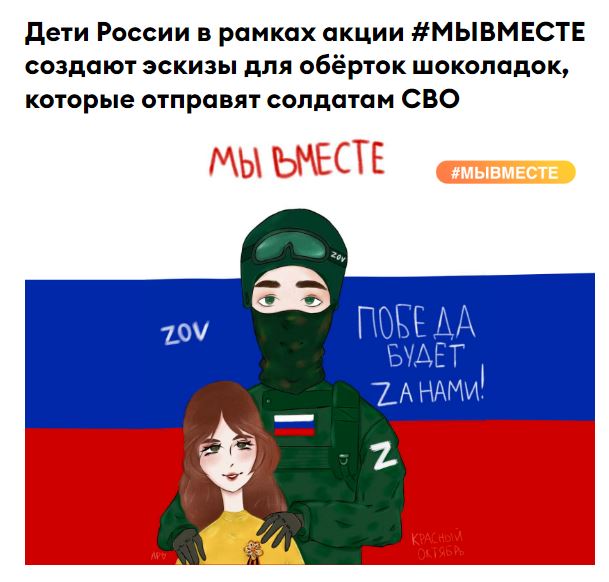
Although Russia's Red Cross claims it does not collect military gear or dual-use equipment, one of the ways that funds can be donated is through the MyVmeste platform, thus financially and politically supporting all ways in which MyVmeste helps the Russian Army. These actions were called out by the Red Cross' Ukrainian office, which called upon their partners in the International Red Cross to "take strict measures for prevention of such measures" by the Russian Red Cross (a live version of the appeal was unavailable at publication time, with the Ukrainian Red Cross' website stating it is down due to DDOS attacks).
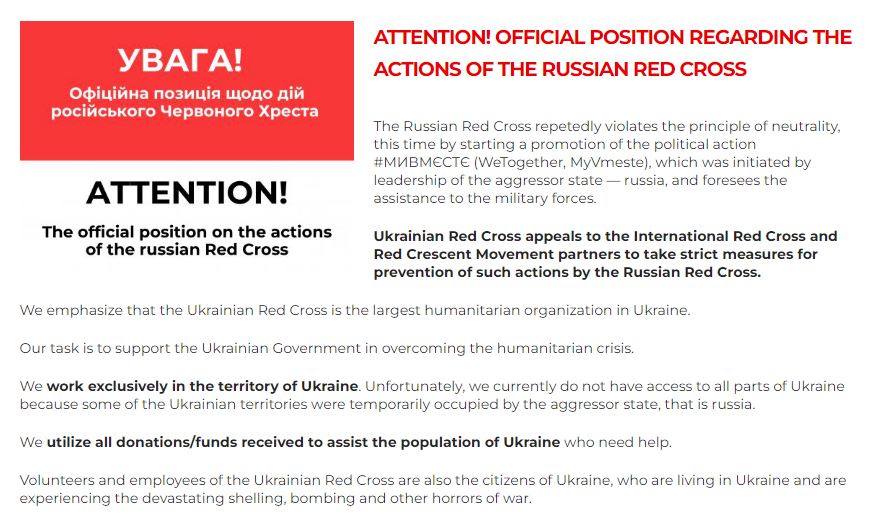
Kamchatka department of Russian Red Cross openly gathers aid for Russian soldiers
While the Russian Red Cross states on its website that it does not gather military aid and dual-use equipment, at least one of its centers openly does exactly that. On its website, the Kamchatka regional department of the Russian Red Cross announces that as part of the MyVmeste campaign, to help "victims of the crisis in Ukraine, military personnel and their families," it is collecting "humanitarian aid," including such frontline staples as thermal underwear, socks, individual first aid kits, sleeping bags, and other additional elements of [military] gear and equipment.
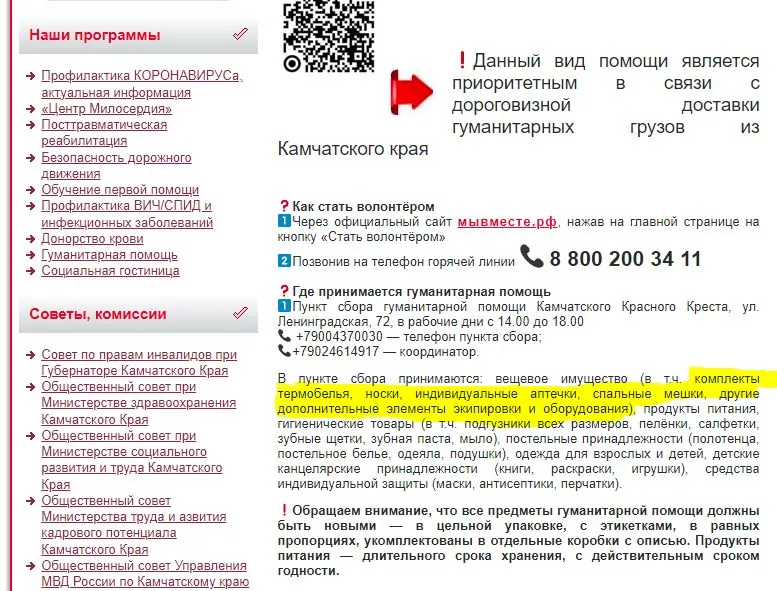
To see how far the Russian Red Cross' compassion for soldiers of the invading army goes, Anton Bogdanovych, an activist of the Australian organization Ukrainians in Sydney, dialed up the Kamchatka office and asked what exact aid for servicemen they accept. The answer was: warm clothes, instant food products, diapers, first aid kits, hygiene products, sleeping bags; if he has them, he can also bring toys and coloring books (because they are collecting aid not only for the mobilized).
"Additional elements of gear and equipment" include, according to the Red Cross worker, "balaklavas and stuff like that." He reads out a list of equipment that can be donated to servicemen on a Russian government website.
Anton asks if he can bring military uniforms and drones to the Red Cross office. The worker says: yes, please bring it to their office at Leningradskaya 72, which is "considered as sort of a unified donation center" from various agencies.
Even if we assume that the Kamchatka Russian Red Cross office could collect the military uniforms and drones "on behalf" of other agencies in their "unified collection point," it is clear that:
- they are clearly taking a side by partnering with a Russian state-supported home front movement and providing symbolic and logistical support for the Russian war efforts;
- the thermal underwear, instant food, and medical kits delivered as "humanitarian aid" to notoriously underequipped Russian troops are helping them invade Ukraine.
Neutrality principle "severely violated," Ukrainian Red Cross says
Answering an inquiry by Euromaidan Press, the Ukrainian Red Cross office said that the very fact of the Russian Red Cross' "severe violation of the principle of neutrality" raised their concerns about its professional qualifications:
"The principle of neutrality implies that under no circumstances should a member of the Movement, or the Movement as a whole, take sides or be perceived as taking sides in an armed conflict. The neutrality of the Movement helps to convince the parties to the conflict that helping civilians and wounded or imprisoned combatants does not constitute interference in the conflict.
Even if you are not familiar with the principles of our Movement, you can see that the principle of neutrality is violated," the Ukrainian Office said in a written answer.
With their appeal, the Ukrainian Red Cross addressed the International Federation of the Red Cross and Red Crescent, the International Committee of the Red Cross and Red Crescent, and also wanted to draw the attention of the National Partner Societies with which they closely cooperate.
"At the very least, we expected to hold conversations with the leadership of the Russian Red Cross and remind them of the fundamental principle of neutrality," the Ukrainian Red Cross told Euromaidan Press, declining to answer whether their request was answered.
Is it possible for the International Red Cross to influence the Russian Red Cross? This is unclear because the 192 national Red Cross societies each have their own statute and are constrained by the legislature of their respective countries. Each one is not a branch but a separate organization with its own legal status, meaning that the international office does not have direct levers of influence on the behavior of the national societies.
However, the international organs of the Red Cross, the International Committee of Red Cross and International Federation of Red Cross and Red Crescent Societies, can influence National Societies to improve the situation if there is a breach of the seven fundamental principles of the movement. This includes independence, neutrality, and impartiality, in order to save lives and prevent human suffering no matter who they are or where they live.
As Anastasiia Shvets, communications officer of IFRC, explained, there exist "strong compliance mechanisms in place to address integrity issues within the membership in case of a breach of the Fundamental Principles" and the ICRC and IFRC are to engage bilaterally with the National Societies if problems arise.
International Committee of Red Cross studying issue
In a written comment, Anastasiia Shvets stated that they are aware of the reports on the Russian Red Cross's involvement in the MyVmeste campaign and are establishing the facts before commenting publicly:
"We are taking the issues raised seriously and we will continue our engagement and robust discussions with the Russian Red Cross with a view to ensure that our fundamental principles are fully adhered to. We want to assure people that we are in dialogue with the Russian Red Cross on this matter and are concerned about any branch of the Red Cross and Red Crescent Movement being a part of any advocacy campaign that is not in alignment with our fundamental principles and can impact our perceived neutrality."
Ms. Shvets clarified that the Red Cross/Red Crescent societies worldwide are able to interact with military members as well as help civilians, for humanitarian purposes only, including the families of military members, including re-establishing links between lost loved ones, ensuring dignity for wounded soldiers and those who have died, helping children whose parents are deployed cope with stress and providing first aid training.
"The ongoing domestic campaign launched by the Russian Red Cross is based on the needs of the local population and focused on supporting the most vulnerable families with children where one of the parents has been mobilized, with food and hygiene items. No Russian Red Cross funds will be used to purchase military equipment, for mobilized citizens and military personnel. Launching a domestic fundraising campaign to support vulnerable people is not a violation of our code of conduct" -- this is the official position of the ICRC and IFRC, Ms. Shvets told.
Activists press for condemnation
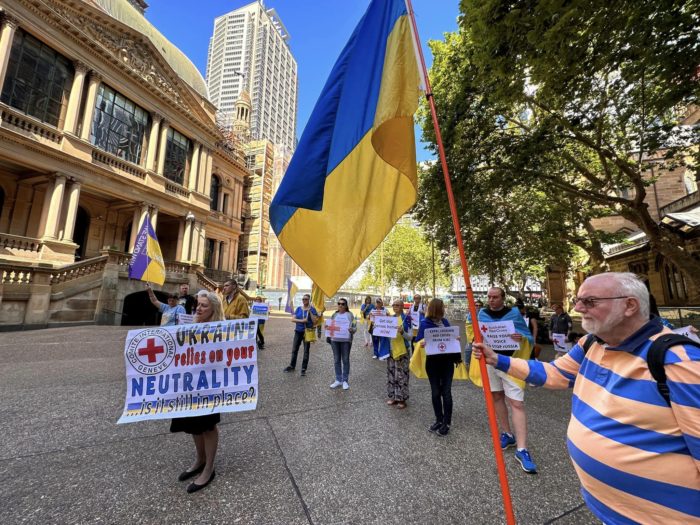
"We want the Russian Red Cross to stop helping the Russian army. It should either completely stop all of this activity and fully disengage with the MyVmeste fund or should be expelled from Red Cross and banned from using the Red Cross name and logo," Anton Bogdanovych told Euromaidan Press.
Mr. Bogdanovych, who had earlier led efforts to force Australian companies Atlassian and Canva to leave the Russian market, participates in bi-weekly protests at the Red Cross in Australia.
The Australian office assures the activists that the Red Cross Movement "is taking the situation with the allegations in Russia very seriously and are currently looking into the issue through continued dialogue at senior levels with both National Societies. The Movement is also concerned about any National Society being part of broader fundraising or advocacy campaigns that can impact our perceived neutrality, this issue is also a key part of active senior dialogue," Mr. Bogdanovych told Euromaidan Press.
But no real actions followed. Since then, the Australian activists are now pressing their local Red Cross office to get it to react to the situation with the Russian Red Cross's aid to the Russian military because they understood that the "Red Cross is in no rush to do anything about the situation."
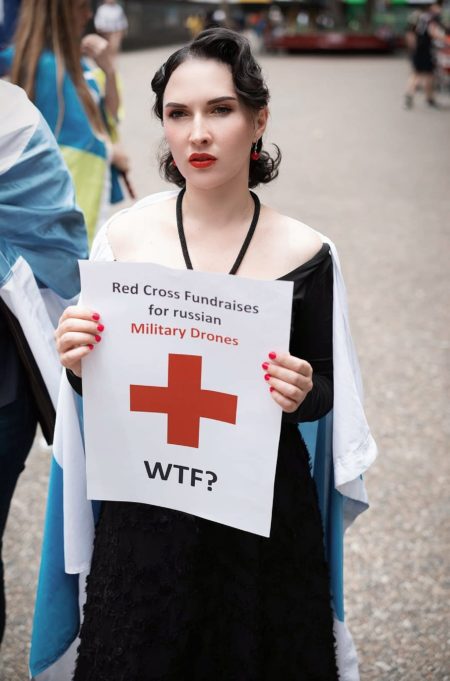
"Red Cross Russia helps fund Russia's war, decreases its cost for the Russian government, and helps acquire critical resources that are currently lacking so that more people can be killed on both sides. At present, a lack of military uniforms prevents Russians from deploying more mobilized soldiers on the front line, the lack of drones prevents them from correcting artillery fire and destroying more critical infrastructure in Ukraine, etc. The fact that Red Cross helps with committing these war crimes is beyond appalling.
Naturally, we don't want Russia to be helped with killing, raping, and torturing Ukrainians. Many people trust the reputation of the Red Cross without thinking, many donate for years, and many don't question where the money that they donate will go because they trust the brand. International funding goes to Red Cross Russia too. By committing such acts Red Cross legitimizes what Russia is doing in this war and makes helping the Russian army appear noble. We don't want the Red Cross brand to be used for legitimizing war crimes and the genocide of the Ukrainian people," Mr. Bogdanovych explains.
Meet the activists who forced Australian companies Atlassian and Canva to finally leave Russia
Related:
- Russian Red Cross raises funds for families of Russian soldiers
- Zelenskyy rebukes ICRC for insufficient efforts to get access to Ukrainian prisoners
- Russian shelling destroys evacuation base of Red Cross in Sloviansk
- Ukraine’s human rights ombudsman called to liquidate Red Cross for not trying to access POWs in Russia

